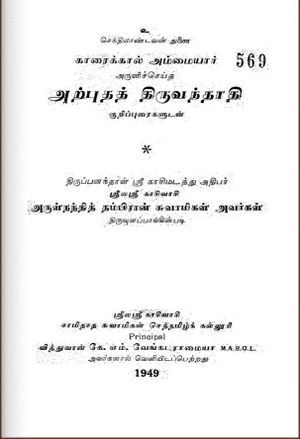Arputha Thiruvandhadhi: Difference between revisions
(Changed Category to Standardized) |
|||
| Line 10: | Line 10: | ||
The collection includes the songs showing the manifestations of Karaikal Ammayar’s Shiva experience, pleadings to God such as ''"Nee enakku Udhavi Seyalakatha?"'' (meaning- "Can’t you help me?"), ease of reaching the God, Karaikal Ammayar’s calmness, and God glorification disguised in the commands of an authoritative mother (''Ninda Stuti)''. | The collection includes the songs showing the manifestations of Karaikal Ammayar’s Shiva experience, pleadings to God such as ''"Nee enakku Udhavi Seyalakatha?"'' (meaning- "Can’t you help me?"), ease of reaching the God, Karaikal Ammayar’s calmness, and God glorification disguised in the commands of an authoritative mother (''Ninda Stuti)''. | ||
====== Representative Songs of ''Arputha Thiruvandhadhi'' ====== | ====== Representative Songs of ''Arputha Thiruvandhadhi'' ====== | ||
''Piranthu mozhi payindra pinnellan kaathal'' | ''Piranthu mozhi payindra pinnellan kaathal'' | ||
| Line 36: | Line 35: | ||
==References== | ==References== | ||
[https://ta.wikisource.org/wiki/%E0%AE%85%E0%AE%B1%E0%AF%8D%E0%AE%AA%E0%AF%81%E0%AE%A4%E0%AE%A4%E0%AF%8D_%E0%AE%A4%E0%AE%BF%E0%AE%B0%E0%AF%81%E0%AE%B5%E0%AE%A8%E0%AF%8D%E0%AE%A4%E0%AE%BE%E0%AE%A4%E0%AE%BF Arputha Thiruvandhadhi Songs] | [https://ta.wikisource.org/wiki/%E0%AE%85%E0%AE%B1%E0%AF%8D%E0%AE%AA%E0%AF%81%E0%AE%A4%E0%AE%A4%E0%AF%8D_%E0%AE%A4%E0%AE%BF%E0%AE%B0%E0%AF%81%E0%AE%B5%E0%AE%A8%E0%AF%8D%E0%AE%A4%E0%AE%BE%E0%AE%A4%E0%AE%BF Arputha Thiruvandhadhi Songs] | ||
[[Category:English Content]] | [[Category:English Content]] | ||
[[Category:Ready for Review En]] | [[Category:Ready for Review En]] | ||
[https://www.tamildigitallibrary.in/book-detail?id=jZY9lup2kZl6TuXGlZQdjZh9jhyy&tag=%E0%AE%85%E0%AE%B1%E0%AF%8D%E0%AE%AA%E0%AF%81%E0%AE%A4%E0%AE%A4%E0%AF%8D+%E0%AE%A4%E0%AE%BF%E0%AE%B0%E0%AF%81%E0%AE%B5%E0%AE%A8%E0%AF%8D%E0%AE%A4%E0%AE%BE%E0%AE%A4%E0%AE%BF#book1/ Arputha Thiruvandhadhi with Explanation] | |||
{{Standardised-en}} | |||
Revision as of 12:38, 18 October 2022
இந்தப் பக்கத்தை தமிழில் வாசிக்க: அற்புதத் திருவந்தாதி
Arputha Thiruvandhadhi is a volume of hymns constituting the 11th Thirumurai (collection of Tamil hymns on Shiva). Karaikal Ammayar, one of the 63 Nayanmrkal (main devotees of Shiva) wrote Arputha Thiruvandhadhi. This is the first book written in the andhadhi format and is known as Adhi andhadhi (meaning- first andhadhi). The songs are on the God and the book is known as Thiruvandhadhi (Devine Andhadhi)
Structure
Arputha Thiruvandhadhi (6th Century CE) is based on a specific prosody known as Venba. It is made of 106 songs.
Content
Arputha Thiruvandhadhi speaks about the norms of the Saivism and full surrendering to Shiva. The hymns describe the divine form, divine mercy and divine character of Shiva.
The collection includes the songs showing the manifestations of Karaikal Ammayar’s Shiva experience, pleadings to God such as "Nee enakku Udhavi Seyalakatha?" (meaning- "Can’t you help me?"), ease of reaching the God, Karaikal Ammayar’s calmness, and God glorification disguised in the commands of an authoritative mother (Ninda Stuti).
Representative Songs of Arputha Thiruvandhadhi
Piranthu mozhi payindra pinnellan kaathal Siranthunin sevadiye sernthen – niranthikagzhum
Mainjandra kandaththu vaanor perumane
Enjandru theerpathu idar (1)
Idarkalaiya renum emakkiranga renum
Padaru Neripaniya renum – sudaruruvil
Enbarak kolath theriyadu memmanark
Kanpara thennenju avarku (2)
Avarke ezhupirappum alaavom endrum
Avarkenam anbavav thallal – pavarchadaimer
Pakapozh soodum avarkallal matroruvark
Kaakappom enjandrum aal (3)
References
Arputha Thiruvandhadhi Songs Arputha Thiruvandhadhi with Explanation
⨮ Standardised-en
Please do not write any content below this line. This section is only for editing templates & categories.

